|
Rand did well in the debate. He had lots of vocal fans, some heated exchanges, and the debate was much more focused without Donald Trump there. I discuss this and whether or not I think Hillary Clinton will be indicted on Fox Business with Dierdre Bolton.
Today's presidential candidates have served up another week filled with myths and fallacies. Fortunately, Ron Paul is here once again to dispel them with another episode of Myth-Busters!
SJ Res 29, which Sen. Chris Murphy has called a "declaration of international martial law," is a very serious issue. America's Founders worked so hard to put the critical issue of war into the hands of Congress, and here we are 240 years later and Congress is giving it up. The President doesn't even have to take it, Congress just hands it over! I discuss this important subject with Alex Jones at the link:
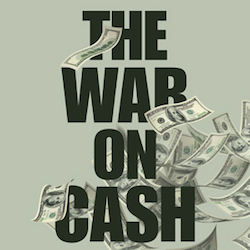
By Paul-Martin Foss
The insidious nature of the war on cash derives not just from the hurdles governments place in the way of those who use cash, but also from the from the aura of suspicion that has begun to pervade private cash transactions. In a normal market economy, businesses would welcome taking cash. After all, what business would willingly turn down customers? But in the war on cash that has developed in the 30 years since money laundering was declared a federal crime, businesses have had to walk a fine line between serving customers and serving the government. And since only one of those two parties has the power to shut down a business and throw business owners and employees into prison, guess whose wishes the business owner is going to follow more often? The assumption on the part of government today is that possession of large amounts of cash is indicative of involvement in illegal activity. If you’re travelling with thousands of dollars in cash and get pulled over by the police, don’t be surprised when your money gets seized as “suspicious.” And if you want your money back, prepare to get into a long, drawn-out court case requiring you to prove that you came by that money legitimately, just because the courts have decided that carrying or using large amounts of cash is reasonable suspicion that you are engaging in illegal activity. Because of that risk of confiscation, businesses want to have less and less to do with cash, as even their legitimately-earned cash is subject to seizure by the government. Restrictions on the use of cash are just some of the many laws that pervert the actions of a market economy. Rather than serving consumers, businesses are forced to serve the government first and consumers last. Businesses act as unpaid tax agents, collecting sales taxes for state governments and paying excise taxes to the federal government, the costs of which they pass on to their customers. Businesses act as enforcers of vice laws, refusing tobacco sales to those under 18 or alcohol to those under 21. Financial institutions, which includes coin dealers, jewelers, and casinos, are required to report cash transactions above $10,000 as well as any activity the government might deem “suspicious.” Cash becomes such a hassle that it is almost radioactive, and many businesses would rather not deal with the burden. Using cash to buy a house is becoming impossible and it is probably only a matter of time before purchasing a car with cash will become incredibly difficult also. Centuries-old legal protections have been turned on their head in the war on cash. Guilt is assumed, while the victims of the government’s depredations have to prove their innocence. Governments having far more time and money to devote to asset forfeiture cases than the citizenry, most victims of cash seizures decide to capitulate rather than attempt a Pyrrhic victory. Those fortunate enough to keep their cash away from the prying hands of government officials find it increasingly difficult to use for both business and personal purposes, as wads of cash always arouse suspicion of drug dealing or other black market activity. And so cash continues to be marginalized and pushed to the fringes. Stemming the anti-cash tide will require a societal attitudinal adjustment that views cash not as something associated with crime, but as a bastion of consumer freedom and a bulwark against overzealous governments. This article was originally published at The Carl Menger Center.
While the Weekly Standard and BuzzFeed are advertising Ted Cruz as the keeper of the libertarian flame, where do real neocons call for carpet bombing and making sand glow in the dark? Is this a media snow job?
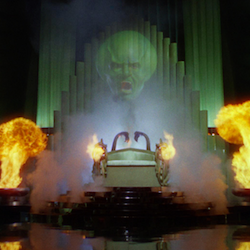
By Chris Rossini
If you haven't watched yesterday's Liberty Report on the "deep state," be sure not to miss it. Most Americans live under the impression that The President of The United States is some kind of super-being that has his finger on the pulse of the world. He then uses his super-computer brain to take in vast amounts of information, which he then uses to "run the world," "run the economy" and perhaps someday soon "run the universe"! Of course, none of this is even remotely true, but government and truth are arch enemies so it doesn't really matter. What does matter is that American citizens believe that it's true. And thanks to compulsory government schools, which bamboozle Americans in their most innocent years, followed by the mainstream media, which picks up the slack after, the belief in a Superhuman President dominates without much challenge. Fortunately, the Internet is breaking down this matrix. Individuals now have access to The Ron Paul Liberty Report, LewRockwell.com, The Mises Institute and many other places that remove the wool that has been placed over American eyes. The Internet also provides us with real-life stories from people who have worked with former Presidents, and who are willing to throw the curtain open on The Great Oz. For example, Paul Craig Roberts was a member of the Reagan Administration. He knows how "the system" works. Roberts spells it out in black and white: I have been in White House meetings from which every participant departed with a different understanding of what the president’s policy was. This was not the result of lack of clarity on the president’s part, but from the various interests present shaping the policy to their agendas.
That's a lot different compared to what most Americans believe, isn't it? The President really isn't a super-being that has a super-computer brain that "runs the world". No doubt he wields a lot of destructive power. That's for sure. But the misplaced belief and faith that Americans put into presidents is just flat out wrong.
As promising as the Internet is (and truth is clearly seeping through society) we still have a ways to go. There were oceans of people at the Obama inauguration, with tears streaming down their faces, only to be duped en masse. Today's presidential candidates also criss-cross the country, with their masses believing their every fictional word as well. A president who "runs the world" and "runs the economy" has plenty of believers. The truth is powerful though, especially when people can communicate like we can today. There are plenty of reasons for optimism. 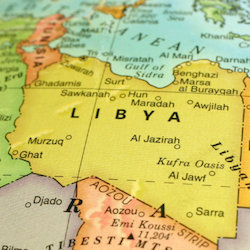
By Adam Dick
In 2011 United States President Barack Obama directed, without any congressional authorization, a US military attack on Libya that was marketed as “humanitarian intervention.” As Ron Paul Institute for Peace and Prosperity Executive Director Daniel McAdams observed in August of 2014, the result of military action by the US and other governments against Libya was destruction, violence, and chaos, not the promised “democracy, prosperity, and freedom from tyranny.” Glenn Greenwald warns in a new Intercept article that the US government is planning another go at attacking Libya. Writes Greenwald: Just as there was no Al Qaeda or ISIS to attack in Iraq until the U.S. bombed its government, there was no ISIS in Libya until NATO bombed its. Now the U.S. is about to seize on the effects of its own bombing campaign in Libya to justify an entirely new bombing campaign in that same country.
The new military action appears to be an example of the crisis and leviathan process that Ron Paul Institute Academic Board Member Robert Higgs has pointed out governments use again and again. Higgs explains the process in a March 2009 lewrockwell.com aricle:
How do once-free people lose their liberty? The formula may be stated succinctly: crisis and leviathan. Alternatively, and somewhat more fully stated, the procedure for the government officials and their supporters who hope to gain by quashing the people's liberties is (1) cause a serious crisis, thereby heightening the public's fears, and (2) blame others for the crisis, pose as the people's savior, and thereby justify the seizure of new powers allegedly necessary to remedy the crisis and to prevent the recurrence of such crises in the future. This gambit is as old as the hills, yet, given the right ideological preconditions, it works every time. Strange to say, the people never learn (in part because these experiences produce ideological change that fortifies the fiscal and institutional changes the government makes during the crisis).
More US military intervention in Libya will cost Americans in dollars and, potentially, lives. It may also inspire blowback attacks. US military intervention, with its history of creating “hellholes on Earth,” can also be trusted to make even worse the dismal conditions in Libya. But, Greenwald comments in his article, some people would benefit from a new large-scale military attack:
As it turns out, one of the few benefits of the NATO bombing of Libya will redound to the permanent winners in the private-public axis that constitutes the machine of Endless Militarism: it provided a pretext for another new war.
This article was originally published at The Ron Paul Institute.
The Federal Reserve Board meets today to decide their next brilliant move to save the US economy. Oh wait, they tried a minuscule quarter of one percent interest rate increase in December and the markets have been reeling ever since. What tools do they have left in their toolbox?
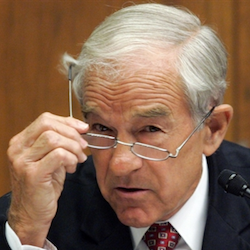
By Ron Paul
Every election, we're told that "this is the most important election in history". Surely we were told so when Barack Obama was elected. It was so important because we were supposedly choosing between a continuation of George W. Bush's policies of continuous war and Barack Obama's who was going to turn the page and put an end to the nonsense. Well, we now know for sure that it was a false choice all along. President Obama is coming to the end of his term by not only expanding Bush's wars, but starting some of his own as well. Yet another instance of "the most important election" being nothing of the sort. It should not come as a surprise to you that I've always downplayed the importance of elections. I've been on the receiving end of distorted results and other electoral chicanery. Americans obsess way too much on elections and whether or not a Republican or Democrat wins. Nothing ever (especially with the most critical issues) really changes. I always approached voting and the elections as a way to help change people's minds. Never did I entertain the thoughts that my election was somehow going to "change the world" as we so often see advertised today. I merely took elections as a vehicle to get information out. What I really want to focus on today what elections have turned into. You know H.L. Mencken once said that: "Every election is a sort of advance auction sale of stolen goods." What's disappointing is how evidently true that statement has become. We see it with the current crop of candidates. Promises of more stuff, to be paid for with other people's money, are so numerous that it's hard to keep track of them all. America's Founders abhorred democracy, and modern-day America is a great example as to why. Americans have conceded philosophically that the government can steal money. It must never be forgotten that government inherently has nothing and produces nothing. The only thing that they can do is steal from somebody. So in the current system, all you have to do is have the majority vote. Once you get that, other people's property are now up for grabs! I'm going to assume that most, if not all, people who are reading this would not willingly walk next door to their neighbor's house, smash down the door, and steal their money. So why is it OK for a politician to do it for you? Where did he get his license to steal? And how can a free society ever exist when some group of people have a license to steal? Always remember, the people in Congress are not thinkers. They're very largely reactors. Our job is to continue to change minds in this country to embrace the ideas of very little government. Government should be there to protect our ability to freely choose, and to protect our lives, liberty and property. Whenever it goes beyond that, and we can all see it with our very own eyes today, society gets turned into a big thieving circus. 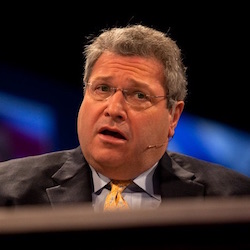
By Chris Rossini
When it comes to foreign policy, Europe has a de facto senior partner in the United States. Such a situation germinated after the two World Wars. Here we are many years later and the senior partner / junior partner relationship has hardened. At the end of 2015, Russia's President Putin said: "The problem of Europe is that it does not have its own foreign policy ... It has transferred part of its sovereignty to NATO and the United States." As a result of teaming up with a country that is steered by self-proclaimed "exceptionalists," Europe is now reaping the brunt of its decisions. Millions of migrants are streaming into Europe from war torn nations that have experienced a good dose of American "liberation". The news (especially foreign and non-mainstream U.S. news) are filled with one story after another of crimes, rapes, and violence that have resulted from these massive migrations. Sadly, European nations have been on the receiving end of blowback for the wars in the Middle East as well. Terror attacks have now occurred on multiple occasions in Europe. It doesn't stop there. Governments usually respond to terror attacks by enacting police state-like laws. Such draconian measures have now been thrown around European necks as well, eroding away at any liberties that still remain. The results of Europe tag-teaming with the U.S.'s militaristic neocon agenda do not appear to be fruitful at all. It seems to have caused nothing but trouble. But worry not Europe. It's not you...It's America. You're just along for the ride. One of the chief protagonists for America's string of neocon war failures, Robert Kagan, spelled it out in his 2004 book: "Of Paradise and Power: America and Europe in the New World Order": When Europeans took to the streets by the millions after September 11, most Americans believed it was out of a sense of shared danger and common interest: The Europeans knew they could be next. But Europeans by and large did not feel that way. Europeans have never really believed they are next. They could be secondary targets - because they are allied with the United States - but they are not the primary target, because they no longer play the imperial role in the Middle East that might have engendered the same antagonism against them as is aimed at the United States.
Perhaps it may be time for Europeans to rethink their alliances with the U.S. Perhaps being the "secondary target" is not such a good deal anymore. Perhaps, in addition to "no longer playing an imperial role in the Middle East," Europe should not ally with, nor support America, which does play that imperial role.
Over here in America, perhaps it may be time for citizens to push for a foreign policy that does not make us the "primary target" and that does not "engender antagonism" against us. A foreign policy of non-intervention, no entangling alliances, peace, travel, commerce and trade would serve us much better. |
Archives
July 2024
|

 RSS Feed
RSS Feed



